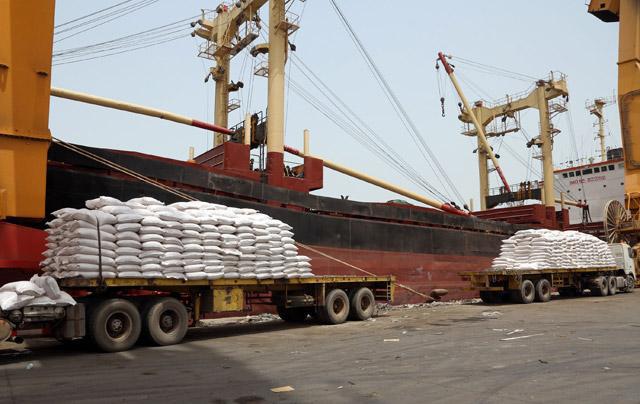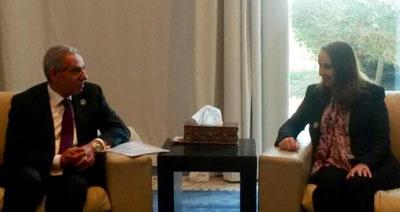You are here
Mega African trade bloc paves way for continental commerce
By Agencies - Jun 11,2015 - Last updated at Jun 12,2015

African government leaders and delegates pose with World Bank President Jim Yong Kim (second left) at the Tripartite summit of Africa’s three major regional economic committees in Sharm El Sheikh, Egypt, in this handout photo provided by the Egyptian Presidency on Wednesday (Reuters photo)
JOHANNESBURG — A $1.2 trillion free-trade area stretching across 26 African countries from Cape Town to Cairo is a stepping stone to uniting the poorest continent as one commercial bloc within the next two years, Africa’s top trade official said on Thursday.
The Tripartite Free Trade Agreement (TFTA) was signed into effect in Cairo this week, amalgamating three of Africa’s main trading blocs: the Southern African Development Community (SADC), the East African Community (EAC) and the Common Market for Eastern and Southern Africa (COMESA).
As well as simplifying Africa’s alphabet soup of overlapping trade zones, the TFTA should boost woefully low levels of intra-regional trade, key to the continent’s economic well-being, African Union (AU) Trade Commissioner Fatima Haram Acyl said.
At the moment, trade between African nations accounts for around 10 per cent of the 54-nation continent’s total commerce, a ratio that has been in gradual decline over the past decade and which compares unfavourably to 25 per cent in southeast Asia.
Enforcing tariff cuts could take five years or more but Acyl said the success of Africa’s deepest free-trade zone, the EAC of Kenya, Tanzania, Uganda, Rwanda and Burundi, suggested the local share of total trade could double in a decade.
“Just removing the trade barriers should increase it to 22 per cent,” Acyl, a Chadian, told Reuters at an AU summit in Johannesburg. “East Africa has been able to do it.”
The TFTA does not include Nigeria, Africa’s biggest economy after revisions to its gross domestic product (GDP) calculations last year, but the inclusion of heavyweights South Africa, Egypt, Angola and Kenya mean it accounts for 60 per cent of continental output.
Negotiations to broaden the new bloc to incorporate West Africa, where the major economies besides Nigeria are Ghana and Ivory Coast, open on June 15 and are expected to wrap up within two years, Acyl said.
That timeline depends on negotiators learning lessons from the pitfalls encountered during the seven years of TFTA talks, she added. “It’s ambitious but we’re not building from zero.”
Few question the economic power of freer trade but sceptics say improving Africa’s infrastructure, there is no tarred road leading from Egypt to sub-Saharan Africa, for instance, might make a bigger difference.
African trade also remains centred on the three countries that have an appreciable manufacturing base, South Africa, Kenya and Egypt, and it is hard to see the TFTA breaking down those structures.
There is even a possibility the TFTA will create another layer of confusion for businesses already contemplating a continent with eight regional trading zones.
However as a statement of political intent, analysts said it was a welcome, long-term force for good.
“Even a marginal increase in cross-border trade could make a difference for small isolated economies,” said Capital Economics analyst John Ashbourne. “And it will provide a real boost to AU efforts to build a continent-wide economic community.”
The TFTA deal, which must still be fine-tuned and ratified, caps five years of talks to set up a framework for preferential tariffs to ease the movement of goods in an area home to 625 million people.
Analysts say it could have an enormous impact on African economies, which account for only about 2 per cent of global trade despite strong growth.
Egyptian President Abdel Fattah Al Sisi, President Robert Mugabe of Zimbabwe and President Omar Al Bashir of Sudan were among those who signed the pact at a summit in the Red Sea resort of Sharm El Sheikh.
“What we are doing today represents a very important step in the history of the regional integration of Africa,” Sisi said as he opened the summit.
“We have told the word today... of our desire to adopt practices that are necessary to increase trade among ourselves... We will do whatever is possible to activate this agreement,” he later said, wrapping up the summit.
World Bank President Jim Yong Kim said that with the launch of the TFTA “Africa has made it clear that it is open for business”.
Bolster intra-regional trade
“The geographical area covers the Cape [of Good Hope] to Cairo... The agreement paves the way for a continental free trade area that will combine the three biggest regional communities,” Ethiopian Prime Minister Hailemariam Desalegn said.
And Mugabe said the deal would create a “borderless economy” that would rank 13th in the world in terms of GDP.
“The establishment of TFTA will bolster intra-regional trade by creating a wider market” that would “increase investment flow... and enhance regional infrastructure development,” a final statement said.
“On the ground, it means jobs being created... or else there could be an Africa spring far worse than the Arab Spring,” COMESA Secretary General Sindiso Ngwenya, who led the negotiations among the three blocs, told AFP.
Negotiators drafted the deal this week in Sharm El Sheikh, and said it addresses such concerns as management of trade disputes and protection for small manufacturers once the TFTA comes into force.
The TFTA has been widely welcomed by world business leaders, with experts pointing out that only 12 per cent of Africa’s trade is between countries on the continent.
‘One trade regime’
In 2013, the UN Conference on Trade and Development stressed that Africa must focus on creating more space for the private sector to play an active role if it is to boost intra-continental trade.
Analysts say although the continent’s growth in the past 15 years outstripped global GDP expansion by nearly three percentage points, falling commodity prices, power shortages, political instability and corruption are still holding back its economies.
Egypt’s Industry and Trade Minister Mounir Fakhri Abdul Nour said the TFTA would help Africa boost trade and investment, while also building infrastructure and production capacities.
Egypt itself expected to export about $5 billion worth of goods in the next five years to TFTA countries.
Officials said companies would benefit from an improved and harmonised trade regime, which would reduce costs by eliminating overlapping trade rules.
“What we have realised is that having one trade regime is better than the costly multiple trade regimes,” said Ngwenya.
“The ultimate goal is to expeditiously establish a single free trade area... then establish a single customs union and then merge” the three blocs, he added.
Related Articles
AMMAN — Industry, Trade and Supply Minister Maha Ali on Saturday requested comprehensive and updated information about the Common Market for
AMMAN — Intra-regional trade within the Red Sea region is improving but still falls behind other regions, according to a research recently p
AMMAN — Industry, Trade and Supply Minister Maha Ali discussed enhancing economic cooperation with several ministers and officials during th



















